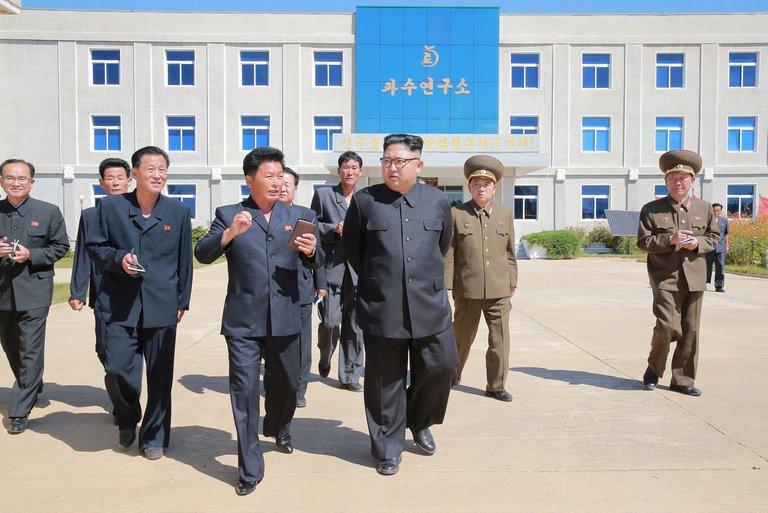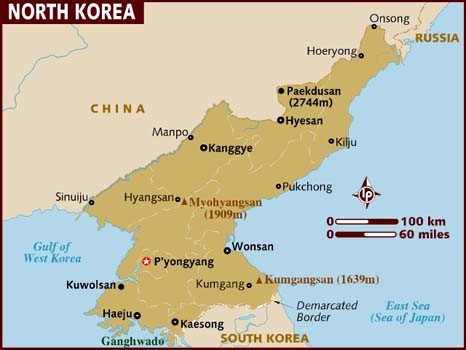North Korea seeks a way out
January 2, 2018 | Expert Insights

Kim Jong Un has announced that he is willing to enter into diplomatic discussions with South Korea in a bid to send a delegation to the Winter Olympics in Pyeongchang. The Winter Olympics will be held in February 2018.
In return, South Korea has offered high-level talks with North Korea on 9 January to discuss the matter further. Will the current tense situation in the Korean peninsula de-escalate?
Background
North Korea is one of the most secretive nations in the world. The United Peninsula was occupied by Japan between 1910 and 1945. Towards the end of the World War II, Soviet troops advanced towards Korea to take over from the vanquished Japanese forces. The United States, which by then had begun to distrust the Soviets, requested them to stop their offensive. By 1948, the country was partitioned into North and South Korea. In 1950, North Korea supported by Chinese and Russian forces invaded South Korea. US forces along with the United Nations intervened on behalf of South Korea and the invading army was driven out. US forces along with the United Nations intervened on behalf of South Korea and the invading army was driven out. Though an armistice was signed in 1953, there has been no peace treaty signed to this day. Currently 28,500 American soldiers, sailors, airmen and Marines form part of United States Forces Korea (USFK) in South Korea.
Despite poor relations, South Korea has sent across aid to North Korea in the past. This is due to the fact the North Korean regime has often been marred by food shortages and famine.
In 2017, North Korea has launched 22 missiles in the span of 15 tests. It has increased its military activity since July of 2017 when it tests launched two intercontinental ballistic missiles (ICBM). In August 2017, North Korea flew two missiles over Japan. The nation called it the “first step” in its Pacific operations. In September 2017, the nation has conducted its sixth nuclear test to date. As a result, the UN has issued multiple sanctions on the nation in a bid to cripple the nation economically and force it into negotiations.
Analysis

In the recent months, both the US and North Korea have increasingly broached the possibility of war, especially nuclear war. In a televised address for New Year’s Eve, North Korean head, Kim Jong Un said that the nuclear option was always on his “desk.”
However, the embattled North Korean leader has also announced that he was willing to enter into diplomatic discussions with South Korea in a bid to send a delegation to the Winter Olympics in Pyeongchang. The Winter Olympics will be held in February 2018. In return, South Korea has offered high-level talks with North Korea on 9 January to discuss the matter further. Will the current tense situation in the Korean peninsula de-escalate?
During his New Year’s Eve address, he said, “North and South must work together to alleviate the tensions and work together as a people of the same heritage to find peace and stability.”
South Korea President however has stated that any improvement in relations between the two neighbors can only take place after the controversy over North Korea’s nuclear programme is addressed. "The improvement of relations between North and South Korea cannot go separately with resolving North Korea's nuclear programme, so the foreign ministry should co-ordinate closely with allies and the international community regarding this," said Moon Jae-In.
Seoul’s unification minister in charge of inter-Korean relations, Cho Myoung-gyon said, “We expect to sit down with North Korea face-to-face and frankly discuss mutual interests aimed at better inter-Korean relations. We look forward to Pyongyang’s positive reaction to this.”
The meeting is slated to take place at the border village of Panmunjom. This would be the first official meeting between the two Koreas since 2015.
Assessment
Our assessment is that despite escalated rhetoric from Kim Jong Un regarding the possibility of a nuclear conflict, he is actively seeking diplomatic resolution to the current crisis. In a rare move, he has extended the olive branch perhaps to ensure that he is able to get the country out the situation that it has been backed into. It remains to be seen if South Korea and America are willing to seek further talks even if North Korea refuses to dismantle its nuclear programme.








Comments